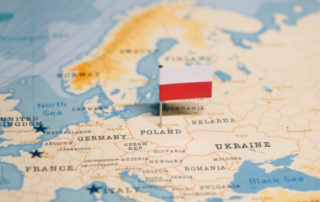
No country is free from market challenges, especially as countries continue to recover from Covid-19 and tackle new global challenges such as the Russia-Ukraine war. While much of Latin America has regions where businesses can prosper, Argentina, Chile, and Mexico are three great options for establishing business operations in Latin America.
Argentina is one of the largest economies in Latin America, with vast natural resources specializing in energy and agriculture. The economy recovered quite quickly after the Covid-19 pandemic: the GDP increased 10.4% in 2021 and 5.2% in 2022 after falling 9.9% in 2020. Despite that recovery, the economy has since contracted and faces high inflation as of February 2023. Argentina reached an agreement with the IMF for a new Extended Fund Facility (EFF) which will allow the country to strengthen its reserves in the short term. There are currently more than 300 US companies operating in Argentina, and significant opportunities for US companies are present in energy, mining, health, agriculture, information technology, and infrastructure sectors. US companies are respected in Argentina for good business practice, transparency, high quality, and good customer service.
Argentina has the opportunity for further development, being a resource-rich country. Argentina has the third-largest lithium reserves, and more than 70% are yet to be exploited, which signal significant opportunity for US companies. Argentina also has the second-largest shale gas and fourth-largest shale oil reserves in the world, and abundant solar and wind energy resources. US technology and equipment are needed to further develop sectors such as energy, mining, and agriculture.
Argentina does present some market challenges that stem from high inflation rates and global and local events. Widespread inflation caused Argentine producers to request more dollars to import the same quantity of goods, and the Russia-Ukraine war has affected prices in the agriculture and energy sectors. Businesses and consumers are limited by trade, financial, capital, price, and foreign exchange controls. The Argentine government also imposes import barriers that affect foreign products and services.
Chile features open market policies, zero tariffs, and a low corruption index, three qualities that make Chile an excellent trading partner and export market for US companies. Chile has a history of economic and political stability, transparency, and democracy. Chileans view US products and services as some of the highest in quality and innovation, so opportunities include high-value projects requiring innovative solutions, such as data analytics. Chile faces high energy costs and is searching for technology and capital to increase through new renewable energy and energy efficiency.
Chile does present some possible market challenges as the government attempts to implement new plans affecting business practices. President Gabriel Boric has proposed broad tax reforms to finance additional social programs which could bring significant change to business rules and regulations in many sectors, including energy and mining. Congress is divided evenly on the issue which provides for the uncertainty. Chile is also experiencing high inflation as a result of the Russia-Ukraine war, but economic growth of 1-2% is still expected and the overall perception of the market is good. New business may struggle due to the extensive competition of the Chilean market as its open trade and investment policy is quite attractive to many foreign companies.
Mexico is the 16th-largest economy in the world and has experienced stable economic growth since the 1990s. Mexico has a large, diverse market, and the United States-Mexico-Canada Agreement (USMCA) provides trade-related benefits for US companies. Mexico and the US have a long history of deep trade and investment ties. In 2021, Mexico was the second-largest overall US trading partner with trade totaling $725.7 billion. Given the size of the Mexican market, opportunities are incredibly abundant for US companies in a diverse range of sectors including aerospace, energy, infrastructure, and information technology. Because of the extensive history the two countries share, Mexico is familiar with and receptive to US products and services, and the USMCA provides unique benefits that may outweigh those of other countries. Mexico presents several market challenges. For example, small and medium sized enterprises may find it difficult to obtain financing at affordable rates due to high interest rates. However, the Mexican Government is making efforts to increase access to capital for these businesses.
Violence related to criminal groups and cartels also creates insecurity in some parts of Mexico. This impacts businesses in a wide range of industries, and it is critical to understand the local security and business climate. As a starting point, the U.S. Department of State provides a set of Mexico Travel Advisories that will provide a starting point to assessing safe travel in different regions.
Latin America offers a lot of investment opportunities for US-based companies. Mexico, Argentina, and Chile all have a long track record of successful US-based investment. It is important, however, to consider the corruption and bribery risks that run rampant in the region. If entering into new markets, anywhere in Latin America, it is critical to conduct deep dive due diligence investigations into any new partner companies or executives that you plan to work with. The US Foreign Corrupt Practices Act (FCPA) regulations are unforgiving when it comes to corruption and bribery related violations.
For Argentina, it will be important to assess the exchange rate and inflation rate risks. While the current situation may present some attractive investment opportunities, the inflation and exchange rate risks will require a longer-term strategy to manage.
For Chile, it will be critical to understand the political and regulatory landscape in order to protect your investment. This requires a boots-on-the-ground approach to examining the local conditions and future outlook.
For Mexico, it is important to assess the local business and security climate in the area you are planning to invest. This will require working with experts to assess the local security situation. A boots-on-the-ground approach is the best practice for gathering the intelligence necessary to make a true assessment on the risks presented.
Overall, given its proximity to the US and openness to foreign investment, Latin America presents a lot of solid business investment options.



